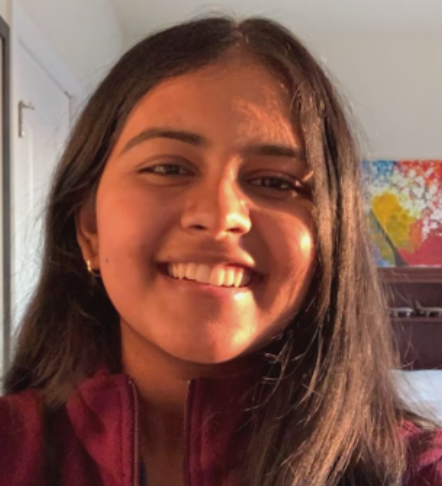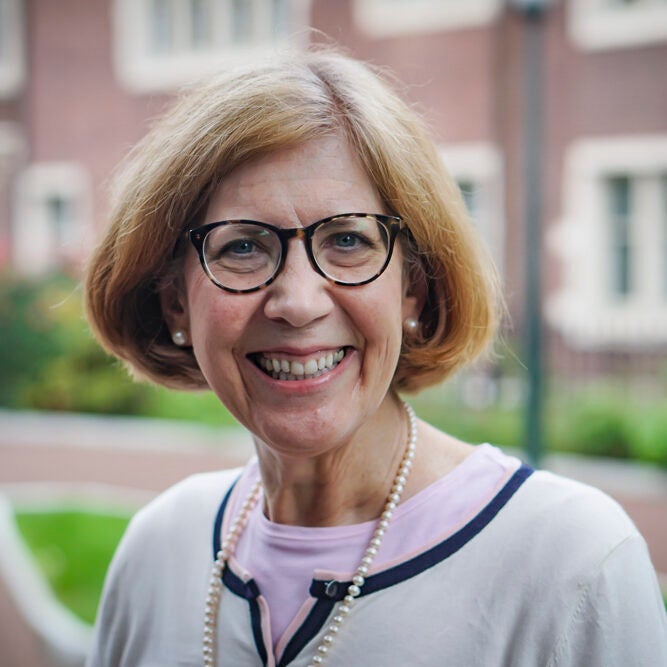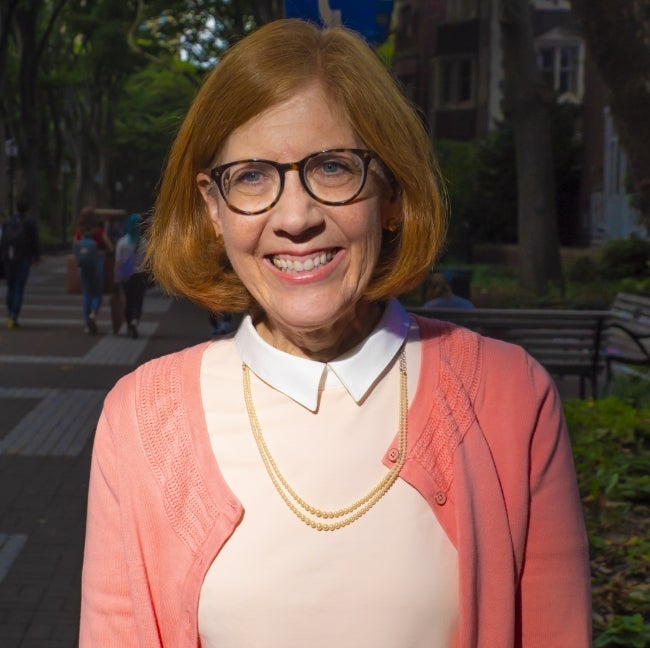Student Spotlight: Aditi Singh
Aditi’s story
I am Carola Agostini, a freshman, Class of 2025, studying in the College of Arts and Sciences. Like many of you who read this, I am also getting to know what life is like at Penn. Before coming to Penn, I’m sure like many others, I watched all of the videos I could find describing the day-to-day activities of students. Now, halfway through my second semester, with the help and support of University Life, I have a chance to tell students’ stories and hopefully show what life is truly like at Penn beyond just a day.
Aditi Singh was my first Student Spotlight. Aditi started working as a tutor during her freshman year. She focused on math and science because she describes herself as a “STEM nerd.” As a fellow tutor, I was very excited to meet someone who I had heard was a successful, resilient, young woman. Personally, I was a bit nervous leading up to my first interview, but, as soon as I met Aditi, she made me feel at ease. Aditi is just one of those people who you never run out of things to say in a conversation. We spoke peer to peer, and she was kind enough to sit down with me and tell me her story.
Aditi had a best friend. They were stuck at the hip, inseparable; however, when they roomed together during her sophomore year, her friend began dealing with mental health issues. Unfortunately, due to extenuating circumstances, Aditi’s friend took a leave from Penn. In the aftermath, Aditi tackled personal changes. She learned how to cope and function without her closest companion. “I think people underestimate how sad things can make you,” she said. “I was devastated.”
Staring out of her residence hall windows, Aditi wondered how she would be able to move forward. She would wake up and crawl back into bed with the hopes of sleeping the days away. Despite her sadness and feelings of uncertainty, she promised her parents and herself that she would continue attending classes and maintaining her grades. Over time, Aditi found comfort in the routine that her tutoring position gave her. Tutoring became the highlight of her day — a constant in her life. Tutoring was something she was good at.

Amidst all the uncertainty, tutoring gave her stability and became a light at the end of a dark tunnel. One day, Valerie Wrenn, the associate tutoring director at Weingarten, asked if she wanted to be the lead math tutor. “That news was way bigger for me than it would’ve been without the hardships,” Aditi said. “It was something, something to hold on to. You wake up one day and the sun is brighter.”
Aditi continued with her process of healing and growing. Now, as I interview her, I see a bright young woman who lights up the room. She is kind, she is smart, she is strong. Most of all, she is inspiring.
Talking with Aditi was the highlight of my day. Like many students often experience, I had a very tough week. Our conversation was comforting: openly talking about the struggles we both went through was therapeutic. Like Aditi said, Penn is hard — there is no sugarcoating it. There will be days, weeks, and even semesters where you are not at your best. Those ‘Day in the Life’ videos that we constantly binge only show snippets of the good parts.
As a community, we are working hard towards breaking what we call ‘The Penn Face.’ We want students to know that it is okay to not be okay. It is okay to seek help, and we encourage you to seek help. Even though Penn can seem daunting, there are great people and resources here to help. There are students like Aditi that light up every room and staff members like Valerie that support their students. If there is anything to take away from Aditi’s story, it is to seek help, surround yourself with people who support you, and do things that make you happy.
Until next time,
Carola Agostini
My Conversation with Aditi
- Why did you want to tutor?
I love tutoring because the look on someone’s face when they understand something is priceless. I don’t know how to describe it, but I cherish the ability to empower other people. It makes me feel so happy for me and for them.
- What did you learn about yourself through the process of tutoring others?
Definitely that you need to be patient. You also have to be creative because it matters how you explain things to people. Since people learn in different ways, you have to think on your feet and adapt to what the person needs. The ability to think on my feet has helped me in so many ways and in so many areas of my life. Additionally, having that level of compassion for other people helps you have compassion for yourself, it increases your self-esteem in the process.
- What is your preferred method of learning?
I am a very auditory learner; I repeat and explain things to myself. I also write things down in order to learn it better. My tutees are mostly visual learners so I make sure to always make flowcharts for them. I also think it is super important to learn how you learn because it makes everything much more efficient.
- How did tutoring help you find your way?
As I mentioned before, the structure really helped me because it gave me a routine so I didn’t have to worry about what comes next. I didn’t touch on this, but Valerie, the associate director, was super supportive. Having someone that supports you make a world of a difference. I really love to mention her because she’s great.
- What strategies do you use when tutoring students?
The more you do something and the more time you spend on it the better you will be. Additionally, I always like to start with the fundamentals, because if you have a strong foundation, you will only get stronger and better the higher you go. I like for my students to explain what they’re learning in class because it helps them actively engage with the content and we can scaffold on information together. After that, we continue with practice problems where they will fill in parts of the problem and then do it on their own. There’s a little bit of hand-holding at first, but then they go off and do it for themselves.
- What is your favorite tiny victory in tutoring?
I was tutoring this group of three people — two girls and one guy — during Covid-19. The guy was very quiet and no matter how hard I tried, I could not get him to speak. Suddenly mid semester, after numerous tries, the guy starts talking and the whole group is cracking jokes. It was just the most wonderful community building I’ve ever experienced. I loved it.
- What advice would you give new students at Penn given your own experience?
It is very important to build a support system here at Penn. I feel like you could feel really lost. My freshman year, I have to mention I wasn’t eating or sleeping right, all these little things that you take for granted. Because of this, I think it is really important to establish a routine. Also, seek help, find help in all the right places. There are so many places that support you, I just didn’t know them as a freshman, I didn’t know where to look. Just start somewhere and actively seek out the help you need. Penn is hard. There is no way of sugarcoating it, so just actively seek out help and don’t concern yourself with people liking you; find and surround yourself with people you like. Acceptance will come and start with yourself.
A Culture of Caring
Four years ago, Sharon Smith, Associate Vice Provost for University Life, laid out a new vision for Penn’s Weingarten Center, the University’s home for academic support and disability services.
“We wanted to put all available offerings in front of students and help them map out a plan,” she says. Smith and her team decided to implement a case management approach to improve student experiences. The impact would be seismic—a cultural shift from à la carte support to a more holistic approach that puts all available services in front of students and guides them through graduation.
Smith’s vision has come to life. With a $2.6 million gift from the Moh Foundation, the Center will get a state-of-the-art space for testing accommodations and learning, reimagined services to support every Penn student, additional support staff, and new technology designed for accessible scholarship in the 21st century.

“With a shared interest in promoting equity and inclusion, our foundation was committed to funding Penn’s most urgent priorities for students with disabilities,” says Peggy Moh, president of the Moh Foundation, proud Penn parent, and member of the Weingarten Advisory Board. “By providing resources for programmatic experimentation, new technology and capital enhancements, we hoped to help solidify the Center’s position as the leader of student support services in the country.”
Slated to open in the fall of 2022, the new testing space, located in the Penn Libraries’ Biotech Commons, will provide an accessible, quiet exam site for students who require testing accommodations. “This is a truly transformative gift,” says Jane Holahan, Executive Director of the Weingarten Center.

“During the COVID-19 pandemic, we had to come up with creative ways to proactively connect people to the resources they needed,” says Niko Simpkins, ENG’22, GEng’23, and a Weingarten Center Ambassador. “I’ve hosted various Weingarten workshops through my student organizations, which worked well in the virtual setting to expose a broader audience of students to the resources that Weingarten has to offer.”
At Penn, the rigors of academic life persist for students at all levels. “I’m inspired every day by my peers who aren’t afraid to ask for help, and also by the other Ambassadors who are unbelievably busy but take time to advocate for and spread the word about the Center,” said Hoang-Anh Phan, Gr’28, a fourth-year Ph.D. candidate in Chemistry and a Weingarten Center Ambassador.
With a history of past support for the Weingarten Center–like funding a new online platform that also enabled the University’s campus-wide COVID-19 screening testing and vaccine scheduling systems–the Moh Foundation has long championed its mission.
“The Moh Foundation has been a valued partner in removing the stigma of seeking help at Penn,” says Ryan Miller, Director of Academic Support at the Weingarten Center. “Our services are now integrated into a broader network that begins in the classroom and carries over to the rest of campus life at Penn. We find that when students—both with disabilities and without—triangulate the Center’s services, they have a network of support with good outcomes often following.
How to engage academic wellness services
I’m here to tap into my full potential,” says Niko Simpkins, a junior majoring in mechanical engineering. “That’s the quote that I live by.” Simpkins envisions excellence, which is why he found himself at the Weingarten Center, poring over past exams with STEM learning specialist Gabriel Angrand. Weingarten is Penn’s hub for tutoring, disabilities services, and academic supports for undergraduate, graduate, and professional students across all 12 schools. Weingarten staff collaborate with campus partners including Academic Advising, Athletics, Counseling & Psychological Services, International Student and Scholar Services, and Penn First Plus.
Weingarten looks at student wellness comprehensively, says associate vice provost Sharon Smith. “So, if a student is with us in tutoring and it turns out they are struggling with concentration, we have the resources and expertise to help them with that within Weingarten,” she says. The goal, she says, is to provide multidisciplinary case management and connect students directly with the help they need.

